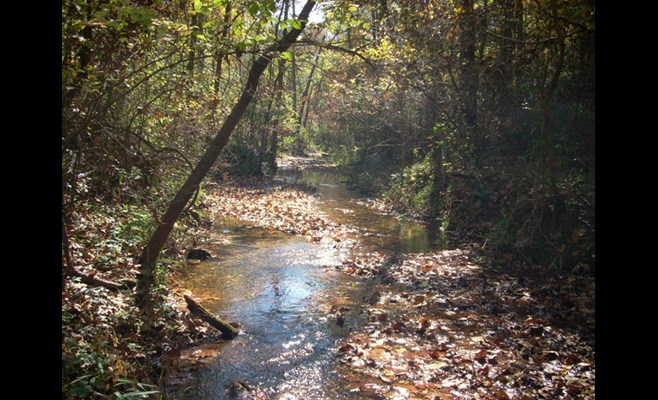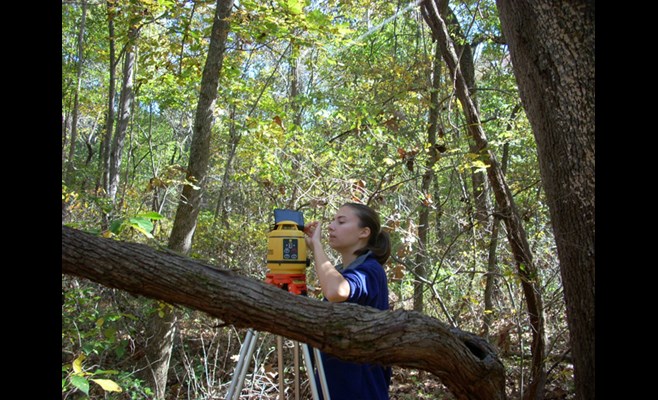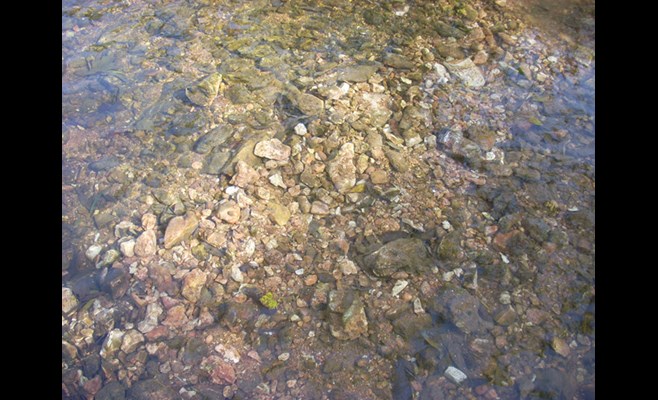Study Findings Have Impact Up and Down Stream
FAYETTEVILLE, Ark. – A University of Arkansas researcher and her colleagues examined streams in urban, agricultural and forested settings and determined that the differences they found may affect how cities try to restore urban streams.
Geosciences researcher Stephanie Shepherd, geosciences professors John C. Dixon and Ralph K. Davis, and graduate student Rose Feinstein report their findings in River Research and Applications.
Shepherd’s work examined the shape of headwater streams, as well as the materials found in them, in cities, on farmland and in forested areas in the Illinois River watershed in northwest Arkansas. She found that the material in streams shifted from gravel in the forested streams to a high percentage of bedrock in the urban streams. Scientists know that urban streams run deeper and faster than forested streams, but until now the reasons haven’t been completely clear.
“The research shows one way that change is occurring in these streams,” Shepherd said. “It also suggests that just making an urban stream look like a forested stream will probably fail.”
To arrive at this conclusion, Shepherd looked at floodplains, measured depths and counted pebbles in streams at several sites in each land use category as determined by land use surveys – urban, agricultural and forest. Forested sites had more sinuous streams than the agricultural or urban sites. The forested streams had meander bends with gravel bars, which were absent in the urban and agricultural streams. Urban streams also ran significantly wider and deeper than those found on farmland and in forests.
The biggest difference between streams occurred in the materials found in the different settings. Urban streams had a lot of exposed bedrock, while agricultural streams had less than 1 percent exposed bedrock and forested streams had no exposed bedrock.
The exposed bedrock in urban streams occurs when cities harden the banks of a stream, create drainage channels or pave and reinforce the landscape surrounding it. This decreases new input into the urban stream. It also forces water into the stream that, in a forested setting, would be absorbed into the ground. This forced water produces high-speed flow, which then moves material such as stones and pebbles through quickly, sometimes scouring the bottom of the stream all the way to the bedrock.
“Streams are not static – materials are moving through them at different velocities all the time,” Shepherd said. “If there are not new gravel inputs in urban streams, we have to think of them as a different system.” Many of the physical characteristics surrounding forested streams, such as large areas of undisturbed soil, cannot be reproduced in an urban setting, she said, so scientists should explore new ways besides simple restoration to mitigate urban streams.
Shepherd and her colleagues work in the department of geosciences in the J. William Fulbright College of Arts and Sciences at the University of Arkansas.
Topics
Contacts
Stephenie Shephard, researcher, geosciences
J. William Fulbright College of Arts and Sciences
479-575-3355,
slsheph@uark.edu
Melissa Blouin, director of science and research communication
University Relations
479-575-3033,
blouin@uark.edu
Headlines
Native American Student Association to Host Annual Choctaw Stickball Tournament
Competition begins at 10 a.m. Saturday the the University Recreation fields on Razorback Road. Carly Keats, a star Razorback basketball player, will play for her home team from Choctaw, Mississippi.
Department of Music Professor to Teach at Italian Festival in June
Richard Rulli, associate professor of trumpet in the Department of Music, has been invited to teach at TrumpetFest June 16-23 in Orvieto, Italy.
Bumpers College Names Senior Scholars, Outstanding Departmental Students
Twenty-five students from 10 different majors and concentrations in Bumpers College were named Senior Scholars for 2023-24, and each department has named its outstanding students for the year.
Music Education Students Bring Fun to Child Development Center
Interactive music sessions known as "music zoos" bring creative learning of musical instruments to the children in the center, as well as providing the music education students the chance to practice their teaching skills.
New Faculty Teaching Portfolio Authors Recognized
The faculty members successfully completed the Teaching Portfolio and will be recognized at the Fall Teaching Awards ceremony hosted by the Cordes Teaching and Faculty Support Center and the Teaching Academy.







